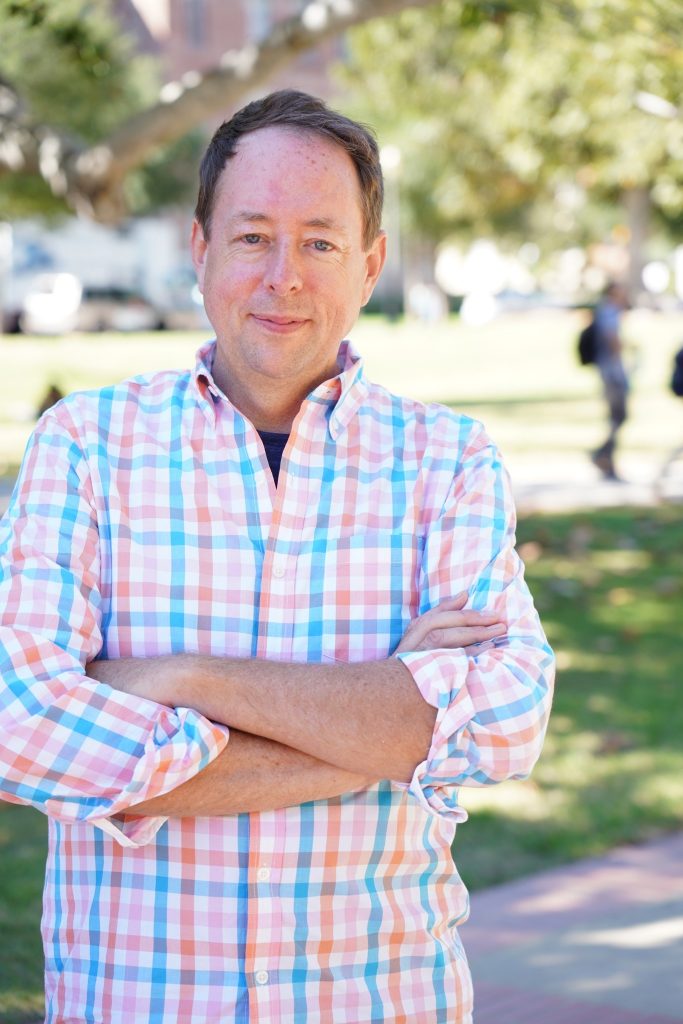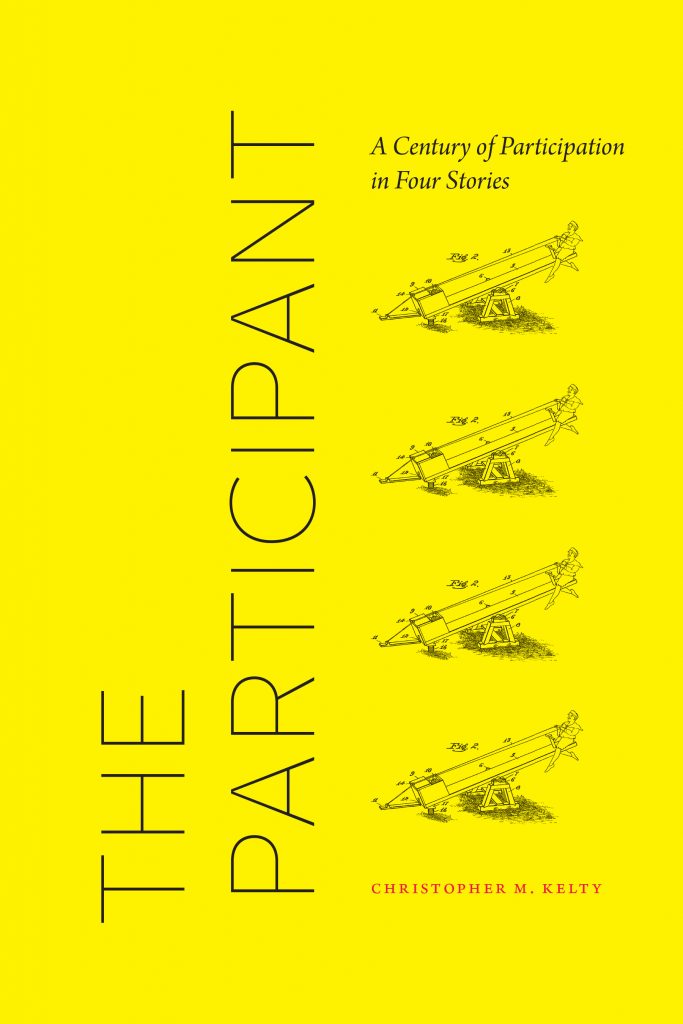Pandemic Participation: Christopher M. Kelty on Isolation and Participation in a Public Health Crisis
Drawing from ideas in his book, The Participant: A Century of Participation in Four Stories, Christopher M. Kelty discusses how participation changes during a pandemic and what it means for the future.
I make a provocative claim in The Participant:
To treat participation as general—and democracy as a more specific apparatus to which it responds—amounts to asserting that participation is prior to democracy. Participation is not a simple component of democracy, but something problematic enough that things like representative parliamentary democracy, federal constitutions, secret ballots, and regimes of audit and regulation are oriented toward dealing with too much, too little, or the wrong kind of participation. This is not a conventional way of looking at democracy, and it will not fit well with a political theory tradition in which participation plays only a bit part in the great historical drama of democracy. I think, however, there is something to be gained by reversing this relation. Instead, one can view participation as a longstanding problem of the relation between persons and collectives, and see liberal democracy as existing in an intermediate temporality where institutions, theories, constitutions, legal systems are in a process of steady transformation. The apparatus we call “liberal representative democracy” is one concrete response to the problem of participation. (42)
It may be obvious or it may be counter-intuitive: social isolation is participation. We are participating in a public health emergency unlike any before it, and it will transform both participation and democracy. To succeed, all of us must participate, because “we are all in this together.” It is, in fact, one of the largest—perhaps the largest—examples of participation that the world has yet seen.
This participation offers hope, especially to those marinating in the dread of climate change inaction. Kim Stanley Robinson, a professional dystopian, has been caught in the New Yorker evincing a guarded hope that, if we can do this, we might actually be able to do something about climate change. The government is listening to experts (sometimes), and the people are believing facts and putting their faith in a plan, albeit one put forward by a government whose chief product hitherto has been the concerted effort to destroy reality for political purposes of uncertain, often suicidal, gain. Nonetheless, hope.
How? All over the world, an assemblage of public health theories and numbers, government bureaucracies, police forces, and media outlets have converged on a simple set of procedures that, if followed by everyone, will prevent many people from dying. That procedure is to stay away from anyone you aren’t already in regular physical contact with, to wear a mask or gloves when you interact with others, and to stay six feet away from others, an experience that will leave people all over the world with a new sense of human proximity.
I highlight here that this is a procedure—a feature I identify in the book as a key problem with contemporary participation. Procedure often blocks or blurs the experience, and hence the power, of participation. The pandemic procedure has two features that demonstrate why social isolation is participation—but also why that definition of participation is anemic. One feature has been built into public health since the 1970s: the single best way to respond to a public health challenge is to find a way to change individual behavior, not collective behavior. A second feature is that by changing your own behavior, you are “doing your part,” and this brings us together: we are all in this together, and so by doing your part, we are all in this together. It is a tautological prophecy of collectivity, but it isn’t necessarily a powerful form of participation. Voting is the same experience: a simple procedure—get out and vote—organizes individuals, not collectives, and means you are doing your part to make a collective. There is nothing, ipso facto, false about these exhortations. But the experience it leaves you with is the one we are all feeling: isolation and distance, but also autonomy tempered by an ever-shrinking definition of contribution; what I call in the book “contributory autonomy.”
Contributory autonomy veers towards a sense of duty, of citizenship, or of camaraderie in the face of a threat, but produces only a temporary, glancing experience of such participation. We participate in social distancing, and (surprise!) we feel alone. This experience pales in comparison to the sacrifice of health-care workers and grocery store clerks whose contribution to this pandemic is so much more life threatening, stressful, and ultimately unrewarded by the very governments that demand their sacrifice. This is why New Yorkers cheer every night and neighborhoods are filled of signs thanking such people. Store clerks and nurses may be feeling, paradoxically, that despite the intensity and self-sacrifice of their participation in this event, that they are not in fact part of something bigger, but more terrifyingly alone, more burdened as an individual, than those around them. It is not autonomous contribution but a perplexed and inexplicable involvement in something that makes no sense, and has no point. And of course, those dying of a disease, and especially those dying alone, can feel no sense of participation. To die alone from a disease we did almost nothing to prepare for is not the same as to die for one’s country, despite the murderous claims to that effect of some on the Right.
Something bigger is happening though. We are also participating in transforming the conditions of work, production and distribution, schooling, health care, and social connection through the use of networked digital platforms run by a handful of extremely large global corporations. This participation is most palpable in the nearly global experience of working and schooling at home, now fully dependent on the technologies of distributed internet-based coordination and interaction. From Zoom universities to fully-at-home white collar work to the awareness that Amazon’s logistical empire is our lifeline to everything from jigsaw puzzles to fresh food. Sometime around March 2020, we went quite gently into this good night.
We now participate fully, and, strangely, both willingly and unwillingly, in the massive expansion of this new form of life. Willingly because it was a simple switch from something that we were already doing: spending more of our days in front of a computer screen; signing up for more and more services that introduced subtle efficiencies at work, play, and home, from project management tools to doorbells to gaming platforms; or even in the best of cases, using such tools to build “mutual aid” networks and provide help more efficiently. Our years of regulating children’s screen time, or our search for tools that didn’t exploit our privacy or that of our friends, evaporated in the grip of urgency. Unwillingly because even if we wanted to, we cannot grasp a 55-page “terms of service” document, or waste time adjusting our privacy preferences, or figure out how to protect our list of contacts and expand them at the same time, or choose a local market over Amazon home delivery, or cook food without YouTube. These are inconveniences that we now impatiently endure and have little time to resist.
If participation precedes democracy, then this participation is a harbinger of our democracy to come. I believe my provocation above: that participation makes governments and not the reverse, whether that is obedience in the name of fascism, or resistance in the name of democracy. To put it starkly, the largest of these platforms—Apple, Google, Facebook, Amazon, Microsoft—now provide many of the substantive goods of human life for many of the people on the earth; they also now govern our public sphere and decide daily what information we will have; they also make hard decisions about legal and ethical relationships in what they police and what they do not; they also deliver our goods and determine their distribution; they possess the largest cash reserves and the most significant philanthropic power in the world; they also employ us; and on and on.
My point is not that this is some evil takeover by corporations shrouded in secrecy and bent only on the deepest exploitation of human life. If only it were that simple. There are alternatives: we can, and some people do, provide all these things more justly through cooperatives and sustained commitments to prefiguring a different life. However, it is through our participation that we have invited this situation, and it will only be through our participation that we remake the good and the bad parts of it. We cannot, even in small ways, fully opt out of what we have now opted into. We might demand that such corporations be regulated, but if participation precedes our capacity to regulate, then we are in an awkward double bind. Can we regulate that which already regulates us? Can we go back on our consent to a contract we didn’t read, in the name of being provided the goods of a life we can’t imagine relinquishing?
Democratic forms of participation are already “regulated” in many ways—positively in terms of the rights we claim to speak, assemble, petition, etc.; negatively in the procedural ways in which that participation is constrained, channeled, or prevented by the governments we participate in. It is exactly these forms of participation—of democracy making—that are being reinvented in the context of the digital platforms that now govern us more than ever. What we participate in will become our government, whether that participation is intentional or unintentional. This is not so far-fetched, but also not so clear-cut. The line between a government and a corporation, for instance, has never been clear: the Dutch East India Company, the Hudson’s Bay company, AT&T, Aramco, Valero, etc. In many times and places, welfare capitalism has rivaled the power of existing nations. To participate willingly or unwillingly in such endeavors is what feeds their power. We should be so lucky this time around.
The idea that forms of participation—states, governments, corporations, markets, churches—have an eternal existence that takes different forms in different times and places is a simple but very tenacious academic mistake. It is only what people do that makes up the things we call governments, markets, churches. And what we do is participate—whether enthusiastically as willing collaborators, or as unwitting or unwilling users. Participation, because it is only a relation, is the only thing eternal about these forms of organization. If it is reduced to a procedure, evacuated of the power of experiencing it, then we shall have neither participation nor government. As far as the democracy we are making, we are not all in this together, yet.

Christopher M. Kelty is professor at the University of California, Los Angeles, where he holds appointments in the Institute for Society and Genetics, the Department of Information Studies, and the Department of Anthropology.
The Participant: A Century of Participation in Four Stories is now available from our website or your favorite bookseller.
